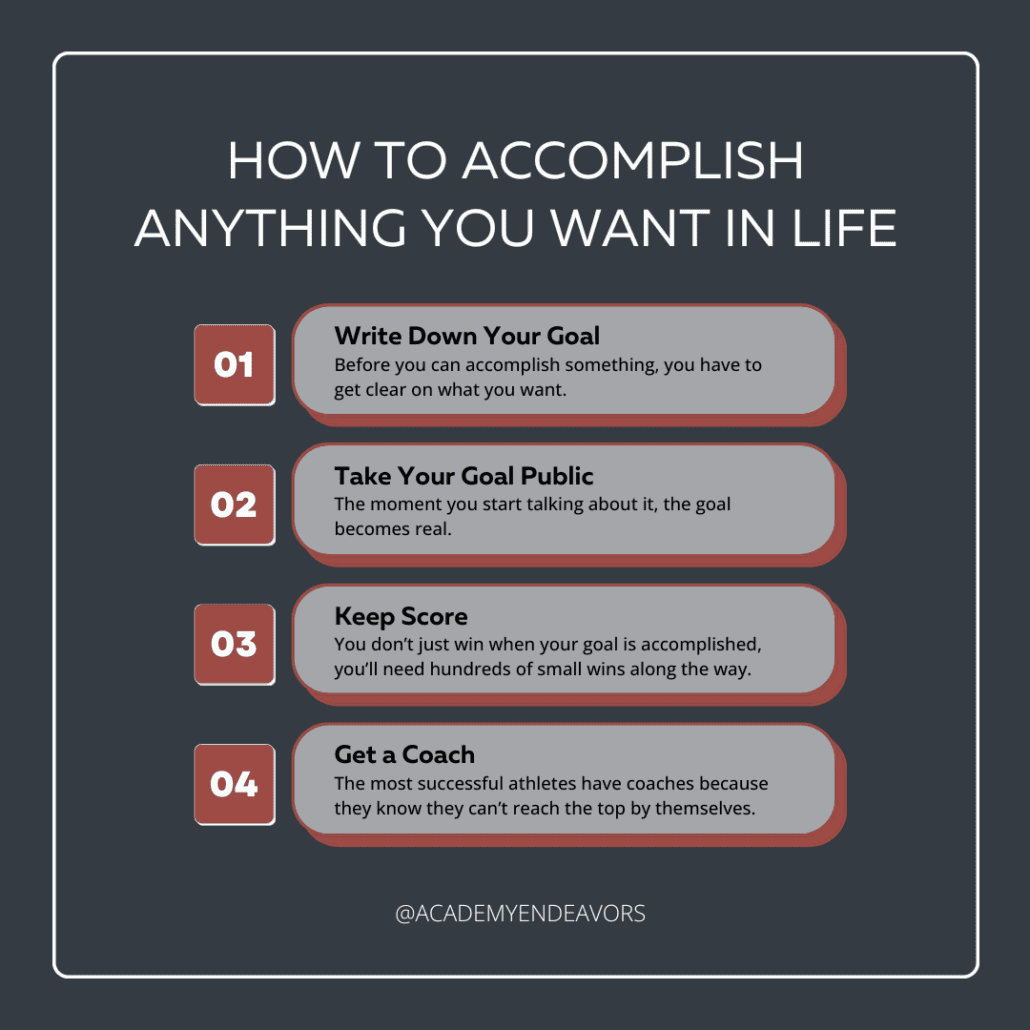The Four Steps to Accomplish Anything You Want in Life

These four steps can be used in any and all aspects of your life. No matter your dreams, Academy Endeavors wants to see you WIN. Follow our guidance, and your dreams will become a reality.
Step #1 – Write down your Goal
Before you can accomplish something, you have to get clear on what you want.
Believe it or not, most people fail, not because they don’t try hard enough, but because they don’t know what they are trying to accomplish. They are too afraid of failure to set a goal for themselves, or too confused on what they want that they don’t even try to get intentional about it.
At the beginning of the year, most people are thinking about new beginnings and setting goals. But they will miss one of these steps.
What I’m about to show you, I promise you, will change your life. If you follow these 4 steps, you can accomplish almost anything you want, and feel much more confident and supported along the journey.
Here’s the formula: “I will accomplish x by y because of z”
There are three blanks: the goal, the deadline, and your personal why.
All three need to be in place. A goal without a deadline is not a goal, its a hope. A goal without a why is not a goal, its a series of uninspiring tasks.
Example 1:
Goal: lose 15 pounds
Deadline: by 31 March 2024
Why: because I want to feel more comfortable in my body
The above example is a clear goal with a deadline, that also explains why. We are very emotional people, so the why taps into the spirit or emotion behind the goal.
Write it down, print it out, and put it up where you will look at it everyday.
Step #2 – Take Your Goal Public
Here’s why I used to fail so often. I kept my goals a secret.
Once you have your “I will accomplish x by y because of z” written down, start talking about it with family and friends. Bring it up at the dinner table, text it to your parents, put it in the group text with your friends.
The moment you start talking about it, the goal becomes real. Your brain will start to get serious about accomplishing it.
Before that point, its just a secret deep inside you. Once you share it with others, it creates an expectation.
People who care about you might follow up with you “hey Riley, how’s that fitness goal coming along? Are you getting better?” “Braden, you said you wanted to go to West Point. How’s the application coming?”
It gives you permission to say “no” to that party because you are studying. People understand now why you might be at tutoring instead of with them. After awhile, it will create a social norm.
Fear will tell you don’t talk about it. For risk of embarassment. “What will people think of me?” “Will they laugh at me?”
Or, “what will people think when I don’t accomplish it? I’ll feel like such a failure.”
Let me tell you, every time you get serious about a goal, there will be fear. Because most people don’t even have a goal, remember? You have to be willing to do things that others aren’t.
But here’s why its even more important: sharing your goal with others will reveal who’s supportive and who’s not. It will show clearly to you where you stand with others. You’ll find out some of your “friends” really aren’t friends. And maybe some of your not so close friends will be closer than you realized.
When this happens, it’ll change your environment – you’ll start to avoid toxic people and hang around more supportive/encouraging people. When you change your environment, you change your future.
That’s why I failed so often – I never took that step to tell my friends my goals. Because I was afraid. But the truth is, it would’ve changed my environment and given me a better chance at accomplishing what I wanted.
Step #3 – Keep Score
The most successful people love keeping score. It makes it super clear if you’re winning.
The truth is, you don’t just get the win in the end when your goal is finally accomplished. You’ll need hundreds of small wins along the way.
A good scoreboard shows you perfectly when you are getting small wins.
I like to win because its fun. It makes me feel like I’m getting better.
A scoreboard is the key.
So…what should you put in the scoreboard?
Here’s the four things every good scoreboard has:
First, your goal is at the top, with your deadline.
Second, your key actions. What behaviors that are most clearly linked to your goal? List those key actions vertically, on the left hand side. For example, if you are trying to do 100 pushups without stopping, you’ll need to do mock tests regularly. Write “mock pushup test” in the key actions.
Third, dates across the top. You have to track whether you are being consistent with those key actions.
Outcomes. You’ll have a series of mini-outcomes that lead to the big goal. Those need to be on the scoreboard so its clear whether you are hitting on the required milestones.
Step #4 – Get a Coach
There’s a reason all the most successful athletes in the world have coaches – it’s because they know they can’t reach the top by themselves. The greater the goal, the more you need a coach.
If you don’t get help, you better be okay with not meeting your goal, or atleast not meeting it in the timeline you desire.
There’s simply no replacement for a guide who says “I’ve done it before, I know what it takes, I’ll show you the way.”
Having a coach creates a cadence of accountability that keeps you focused and encouraged.
Well, you might say, “but Travis, I’m already focused.”
The journey to the top will reveal a myriad of emotions. Lack of confidence, discouragement, despair, self-doubt, anxiety, overwhelmed. All of these feelings are focus killers. They make you feel de-energized, and
The confidence gained, and accountability to your behaviors, can provide groundbreaking results.





